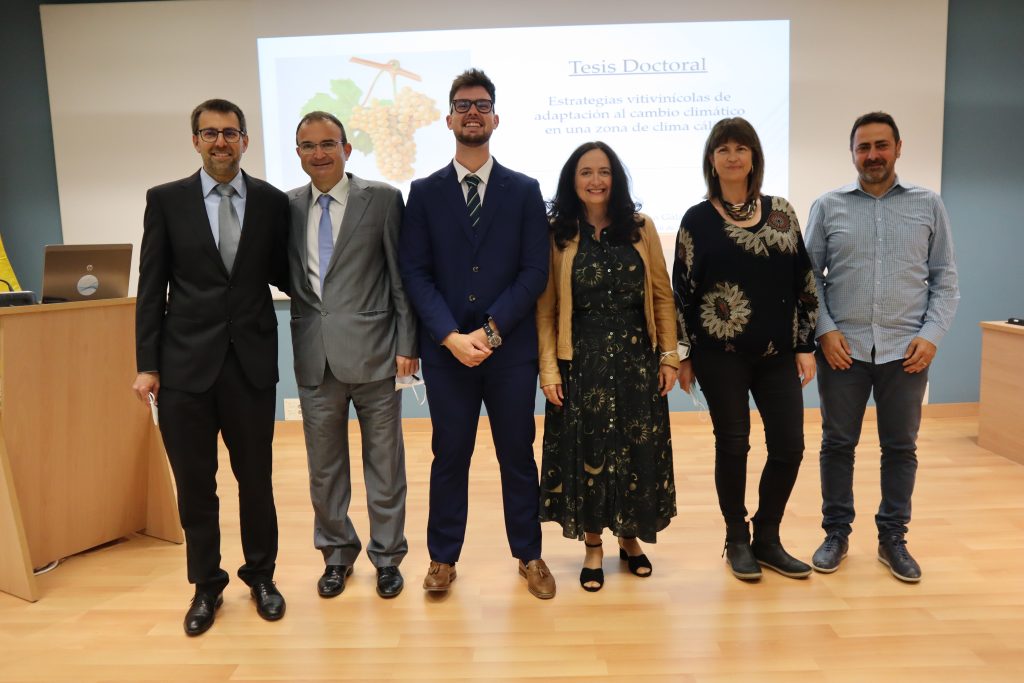Author: Pau Sancho Galán
Supervisors: Dra. Ana C. Jiménez Cantizano, Dr. Victor M. Palacios Macías
DOI
- Genetical, Morphological and Physicochemical Characterization of the Autochthonous Cultivar ‘Uva Rey’ (Vitis vinifera ). https://doi.org/10.3390/agronomy9090563
- Identification and Characterization of White Grape Varieties Autochthonous of a Warm Climate Region (Andalusia, Spain). https://doi.org/10.3390/agronomy10020205
- Preliminary Study of Somatic Variants of Palomino Fino (Vitis vinifera L.) Grown in a Warm Climate Region (Andalusia, Spain). https://doi.org/10.3390/agronomy10050654
- Influence of the Presence of Grape Skins during White Wine Alcoholic Fermentation. https://doi.org/10.3390/agronomy11030452
- Effect of Grape Over-Ripening and Its Skin Presence on White Wine Alcoholic Fermentation in a Warm Climate Zone. https://doi.org/10.3390/foods10071583
- Volatile Composition and Sensory Characterization of Dry White Wines Made with Overripe Grapes by Means of Two Different Techniques. https://doi.org/10.3390/foods11040509
Thesis Abstract
Grapevine (Vitis vinifera L.) is one of the oldest and most widespread crop species in the world, which has contributed to its wide genetic and phenotypic diversity. It is estimated that there are 7.3 million hectares of vineyards worldwide, with Spain being the country with the largest cultivated area in the world. However, climate predictions and simulations forecast that climate change will be one of the major challenges for wine production in the near future, as grape quality and vine yields depend on a complex interaction between temperature, water availability, plant material and viticultural techniques employed. In general, climate change is leading to a generalised earlier harvest, accelerated vine growth and over-ripening of grapes, leading to the production of grape must with high potential alcoholic strength, higher pH, lower acidity and important nutritional deficiencies.
With the intention of minimising the effects that rising temperatures and decreasing rainfall may have on vineyard areas, it is of great interest to study viticultural and/or oenological alternatives that will provide short-term tools to deal with the changes that global warming is going to cause in wine industry. For this reason, this Ph.D Thesis combines research work related to the search for autochthonous grapevine varieties or somatic variants from warm climate zones that may be better adapted to the agro-climatic conditions associated with climate change, and winemaking techniques based on the over-ripening of grapes and/or fermentation in the presence of skins as resilience strategies.
The main results of this Ph.D Thesis show the existence of autochthonous varieties and somatic variants from a warm climate area such as the Marco de Jerez, which present adaptative traits to the conditions imposed by climate change. On the other hand, both the fermentation in the presence of grape skins and the production of dry white wines from overripe grapes can be considered as resilience techniques to adapt to the conditions of increased temperatures during the grape ripening phase imposed by climate change. At the same time, they recover ancestral winemaking techniques and meet the expectations and trends of today’s consumers.


